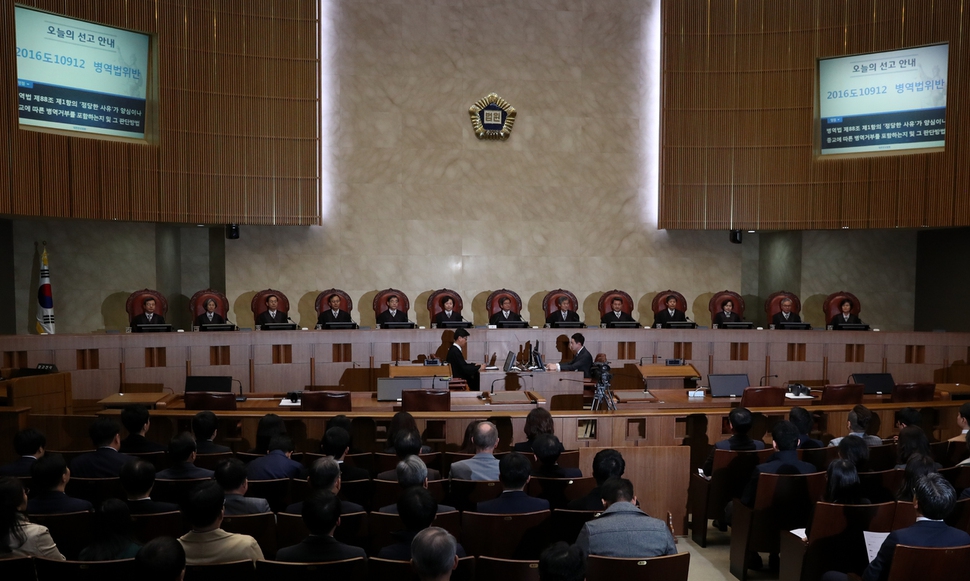 |
|
The appeals trial of the case of conscientious objector to military service Oh Seung-heon at the Supreme Court on Nov. 1, in which Oh was acquitted of criminal charges related to his refusal to perform military service on religious grounds. (Kim Jung-hyo, staff photographer)
|
Justices’ supplementary opinion states Civil Rights Covenant possesses same force as domestic law
The South Korean Supreme Court’s ruling that acquitted a conscientious objector to the country’s mandatory military service included the intriguing supplementary opinion that the International Covenant on Civil and Political Rights, of which South Korea is a signatory, can serve directly as a judicial norm. There has been a debate in the legal community about whether international human rights agreements that South Korea is a member of possess the same legal force as domestic law. A supplementary opinion to the majority opinion by Park Jung-hwa, Kim Seon-soo and Noh Jeong-hee states that “the Civil Rights Covenant ratified by South Korea has the same force as domestic law according to Article 6, Clause 1, of the Constitution and can serve directly as a norm for adjudication.” “Since the Civil Rights Covenant is a treaty that was passed with the consent of the National Assembly, it has the force of domestic law in accordance with the provisions in Article 6, Clause 1, of the Constitution, and its force is at least comparable with the law,” the justices wrote. While the Supreme Court has previously referred to international human rights agreements to which South Korea belongs in its rulings, this is the first time a Supreme Court ruling has specified that civil rights agreements can serve as direct norms for adjudication. Background of Intl. Covenant on Civil Rights Covenant The International Covenant on Civil and Political Rights was adopted by the UN General Assembly in 1966 to increase respect for human rights and basic freedoms, and South Korea joined the covenant in 1990. Clause 6, Article 1, of the Constitution states, “Treaties duly concluded and promulgated under the Constitution and the generally recognized rules of international law shall have the same effect as the domestic laws of the Republic of Korea.” “In trials, other treaties have had the same force as domestic law, but that was not the case of for international human rights treaties. Even the Supreme Court has only regarded them as one element to consider and not as having direct force,” said a judge who stressed the importance of the supplementary opinion. “The right to conscientious objection to military service is not specified in Article 18 of the Civil Rights Covenant, but deducing this right from that article has now become an established international standard. Conscientious objection to military service must be regarded as corresponding to the ‘legitimate reasons’ specified in Article 88, Clause 1, of the Military Service Act in accordance with Article 18 of the Civil Rights Covenant, which is recognized as having identical force as domestic law,” the justices also wrote. Article 18 of the covenant says, “Everyone shall have the right to freedom of thought, conscience and religion. [. . .] No one shall be subject to coercion which would impair his freedom to have or to adopt a religion or belief of his choice.” “In the case of international human rights agreements such as the Civil Rights Covenant, the courts must make an effort to ensure that not only their interpretations of basic constitutional rights but also their interpretations of the law are in accordance with these agreements. Interpreting laws in harmony with international human rights agreements is a duty that the judiciary must perform from the perspective of international human rights,” the justices emphasized. Though this supplementary opinion does not have legal binding because it is not the opinion of the court, it could be an opportunity for the courts to be more proactive about protecting human rights. “The justices’ view that the Civil Rights Covenant serves as a direct norm for jurisdiction represents a major step forward. When future courts are asked to protect rights based on the text of international human rights treaties to which South Korea is a party, this is likely to be widely quoted in district courts’ decisions, and in the end, the protection for Koreans’ rights could be greatly broadened,” one judge said. By Kim Min-kyoung, staff reporter Please direct comments or questions to [english@hani.co.kr]






